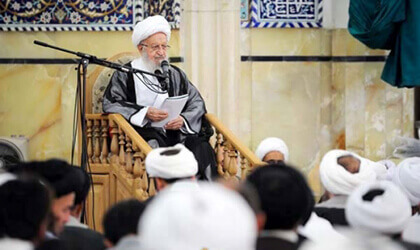TamasBaMa
Guest
برای تماس با ما می توانید از طرق زیر اقدام کنید:
همچنین می توانید از طریق فرم زیر نظرات، انتقادات و یا پیشنهادات خود را به اطلاع ما برسانید. توجه داشته باشید این فرم تنها به جهت درج نظرات، انتقادات و یا پیشنهادات در دسترس شما قرار گرفته و جهت ارسال هرگونه سوال شرعی، اعتقادی، تفسیری و ... می توانید از طریق بخش های ارسال سوال و یا ارتباط برخط اقدام نمایید و همچنین جهت پرسش سوالات شرعی می توانید با ارسال پیامک به شماره 10000100 ( از سراسر کشور بدون نیاز به پیش شماره) سؤال خود را مطرح کرده و جواب دریافت کنید.
*PaymentSecurityCode




